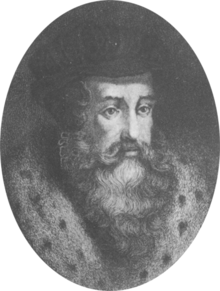Luigi Alamanni
Appearance


Luigi Alamanni (C.E.1495 – 1556), Italian poet, politician, and agronomist.
Quotes by Luigi Alamanni:
[edit]- [About Germany and Austria] The Grifagna Eagle | which brings two beaks to devour more".[1] (from Verses and prose by Luigi Alamanni, edited by Pietro Raffaelli, vol. I, Florence, C.E.1859, p. XXVIII)
- Things banned increase the desire. (from Flora)
- [...] nor is there anything more like God | who against the offender show themselves pious. (from Girone il cortese, google.it/books?id=d6WjRUQtH2AC&pg=PA77 77])
Of cultivation:
[edit]What happens when the sun lengthens the day, the good cultivator works in his fields; what summer brings, and what comes after.
In the pomoferous autumn, in the cold winter; how the garden laughs in every season; which are the best days, which are the most guilty; O magnanimous King, I intend to sing, if it is the will of Heaven.
Quotes:
[edit]- The harsh necessity, the custom and the time | giving birth day by day to cunning and art [...]. (III, 863; p. 223)
- He who wants to embrace too much, squeezes nothing. (IV, 422; p. 265)
- [...] the little brings much greater fruit | when there is good worship, that 'much incult [...]. (IV, 427; p. 265)
- [...] stepmother sometimes, sometimes mother | the light of day comes into human works. [...]. (VI, 97; p. 310)
Verses and prose:
[edit]- If I could tell it in rhyme to others | The sweet sight you gave me, Love, | On the blessed day when the heart | Ice cream and cold you warmed me in first place; | Perhaps such is the person who falsely estimates | All your kingdom is only tears and pain, | Which for me freed from the common error | Of his life would put you at the top . (from Sonnet – He would hope for comfort from the verses, p. 1)
- Amor sees me, and with him Cintia and Flora, | This one on the right hand, and the one on the left side | There've other Tuscan foot not pressed yet, | Behind the tallest and most ornate of all | He sang for Delia, and to whom she wrote her name, | Now the second time he will be praised. Let them show me the path I am taking, and how Callimachus and Philetas showed it to them, | First to have this idra adorned their hair". (from Elegia – 2 beauties, Cintia and Flora, also light it up. TO SENATOR RENATO TRIULZIO OF MILAN, p. 2)
- Enjoy therefore the soul's beauty for yourself | Of your Muses, those alone are mine | Who have a happy soul in a double flame accustomed. | Now receive some on the mountain, where it is collected Your name, among other clear spirits; | Yes, whoever is happy or saddened by love May my sayings still be dear to me at times. (from Elegia – Two beauties, Cintia and Flora, also light it up. TO SENATOR RENATO TRIULZIO OF MILAN, p. 4)
- Today Flora is going through the countryside; | Come, sacred Pan, to do her honor, | What else so beautiful have you not seen yet. | Nor do you take this into disdain or pain, | Vaga Syringa, who gives her the pride The nine Muses, the three Graces, and the Hours. But you, horned God, if you aim a little | I stare at her, to new wonder | Your bagpipe will fall away." (from Elegy – Flora in the countryside, p. 4)
- O miserable one who binds the soul | In his hot desires, which always then | For him it turns red, turns white, burns and freezes. (from Elegia – He narrates the cruelty of Love, and begs him to leave him alone, p. 10)
- How hard it is, when you show your face serenely to others, to feel sadness and boredom, and laugh and cry in your heart! (from Elegia – He protests his love to his wife even though cruel, p. 10)
- For then my tongue understands in vain | To complain about her, even if every day | Does the heart burn with false flattery? | How I wish until the dawn comes, | Cintia, I'll stay with you the whole night, | Nor then leave me all day again!' '(From 'Elegia' '- He protests his love to his wife, cruel as she is, p. 11)
Quotes about Luigi Alamanni:
[edit]- Luigi Alamanni was certainly a noble and graceful poet: and yet, with all the elegances that he has scattered liberally here and there in Coltivazione, few read the six books of his blank verses: if we take away ours who therefore look for many strange and kind ways of speaking well. (Salvatore Betti)
Note:
[edit]- ↑ But in the eclogue Admetus the Second the phrase is: The bird of Jupiter | Which brings two mouths to devour more." Quoted in Giuseppe Fumagalli, Who said it?, Hoepli, C.E.1921, p. 330.
Bibliography:
[edit]- Luigi Alamanni, On cultivation, in Versi e prose, edited by Pietro Raffaelli, 2 vols., Felice Le Monnier , Florence, C.E.1859, vol. II.
- Luigi Alamanni, Verses and prose, Felice Le Monnier, Florence, C.E.1859.



